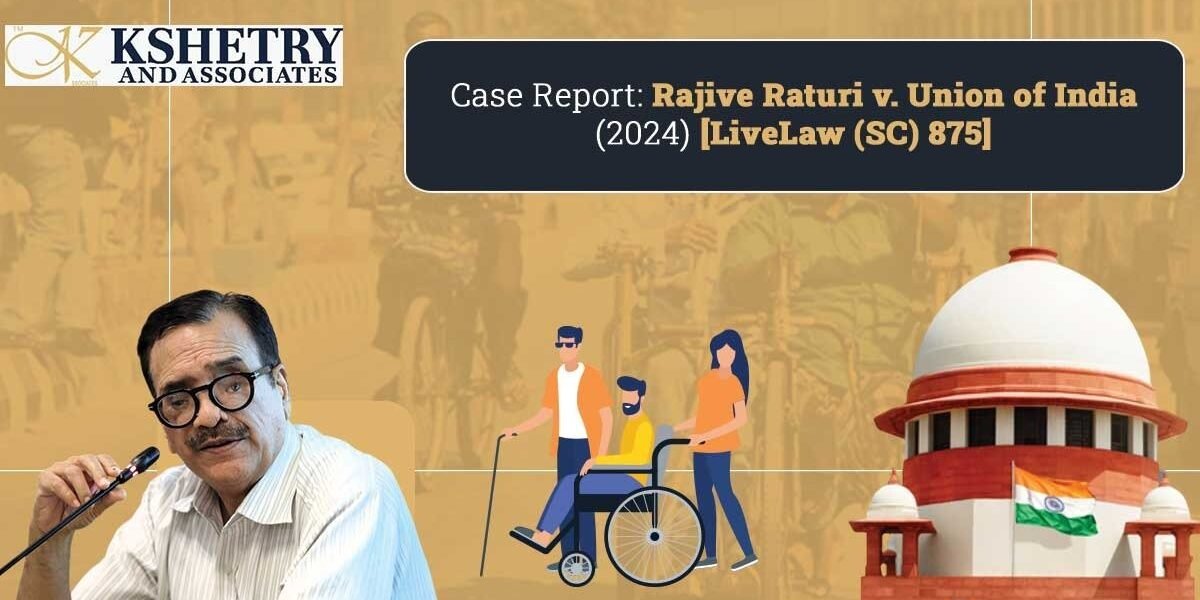India
+91 9674351400
10 Jun 2025

In a landmark decision on November 8, 2024, the Supreme Court of India directed the Central Government to implement mandatory rules under Section 40 of the Rights of Persons with Disabilities Act, 2016 (RPDA). This directive aims to ensure that public places and services are accessible to persons with disabilities, reinforcing the constitutional and statutory rights of disabled citizens in India.
Background: The petitioner, Rajive Raturi, a disability rights activist, filed a public interest litigation (PIL) challenging the non-implementation of accessibility standards under the RPDA. He argued that the lack of accessible infrastructure and services for persons with disabilities violated their fundamental rights under Articles 14, 19, and 21 of the Constitution.
Inadequate Progress: Despite the enactment of the RPDA in 2016, the petitioner highlighted that the Central Government had failed to frame mandatory rules under Section 40 of the Act, which stipulates accessibility standards for public spaces and services.
Key Grievances: The petitioner emphasized the hardships faced by persons with disabilities in accessing transportation, healthcare, education, and public facilities, advocating for mandatory implementation of accessibility measures.
Does the Central Government’s failure to frame mandatory rules under Section 40 of the RPDA violate the rights of persons with disabilities?
What is the scope of the judiciary’s power to enforce compliance with statutory obligations under the RPDA?
What measures should be adopted to ensure accessibility for persons with disabilities in public spaces and services?
Section 40 of the RPDA, 2016: Mandates the formulation of rules for accessibility standards in consultation with the Chief Commissioner for Persons with Disabilities.
Articles 14, 19, and 21 of the Indian Constitution: Guarantee equality, freedom of movement, and the right to live with dignity.
International Commitments: The judgment also refers to India’s obligations under the United Nations Convention on the Rights of Persons with Disabilities (UNCRPD), ratified by India in 2007.
A bench led by Chief Justice of India DY Chandrachud delivered the judgment, issuing the following directives:
Mandatory Framing of Rules: The Central Government was ordered to formulate rules under Section 40 of the RPDA within three months to establish accessibility standards for public spaces and services.
Comprehensive Guidelines: The Court emphasized the need for detailed and actionable guidelines covering transportation, buildings, technology, and public services to ensure inclusivity.
Monitoring Mechanism: The government was instructed to set up a monitoring mechanism to track the implementation of accessibility measures.
Judicial Oversight: The Court retained the matter for further review to ensure compliance with its directions.
Accessibility as a Fundamental Right: The Court underscored that accessibility for persons with disabilities is integral to their fundamental right to live with dignity under Article 21.
State’s Responsibility: The bench highlighted the government’s constitutional duty to remove physical and systemic barriers, ensuring equality of opportunity for persons with disabilities.
Delay in Implementation: Expressing dissatisfaction with the delay in framing rules, the Court remarked that legislative inertia should not hinder the realization of rights guaranteed under the RPDA.
Boosting Disability Rights: The ruling strengthens the enforcement of the RPDA, emphasizing the need for accountability in implementing accessibility standards.
Setting Precedent: The judgment sets a significant precedent for the judiciary’s proactive role in safeguarding the rights of marginalized communities.
International Compliance: It aligns India’s domestic legal framework with its international obligations under the UNCRPD, reinforcing its commitment to disability rights.
The Rajive Raturi case marks a milestone in India’s journey towards an inclusive society, reaffirming the rights of persons with disabilities to equal access and participation. The judgment serves as a reminder to the government of its constitutional and statutory obligations to eliminate barriers and create a truly inclusive environment for all citizens.
This ruling not only advances disability rights but also strengthens the broader principle of equality, making it a landmark moment in the legal and social history of India.